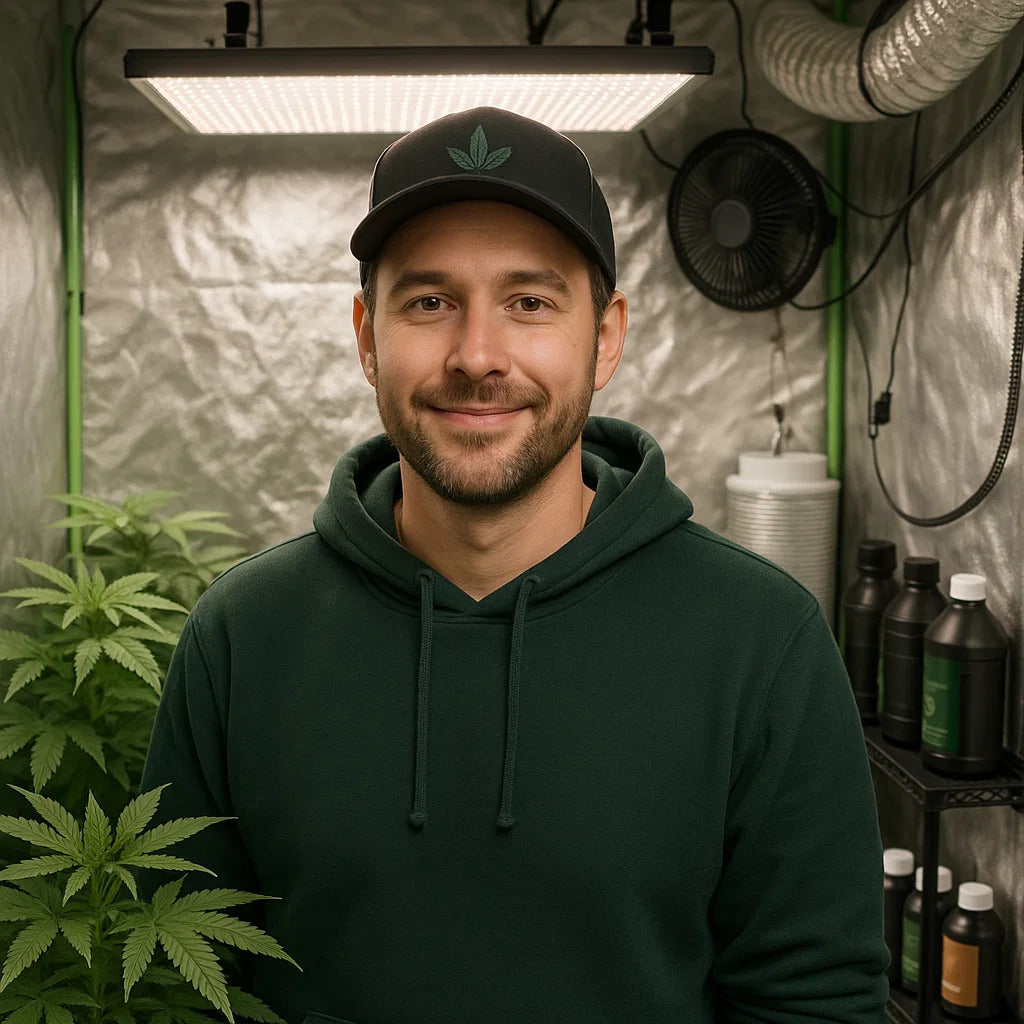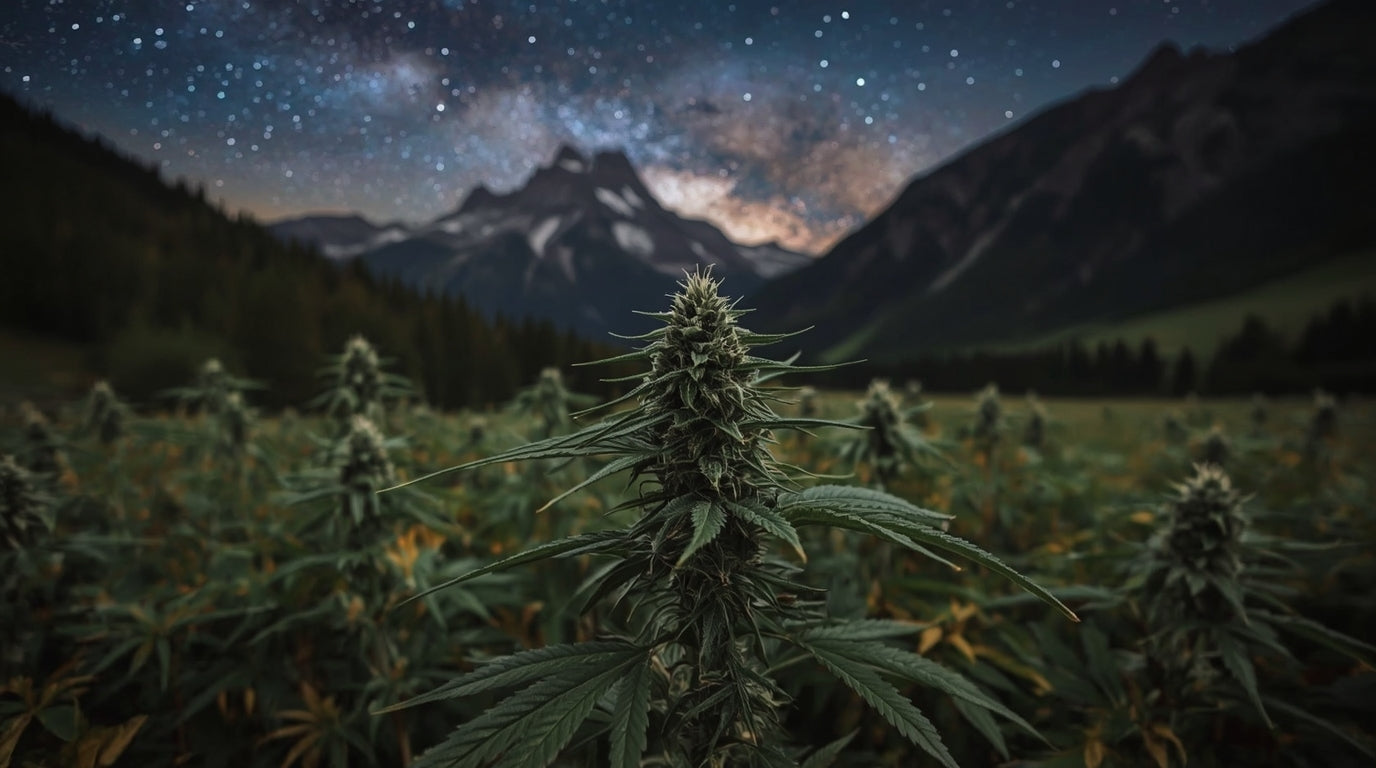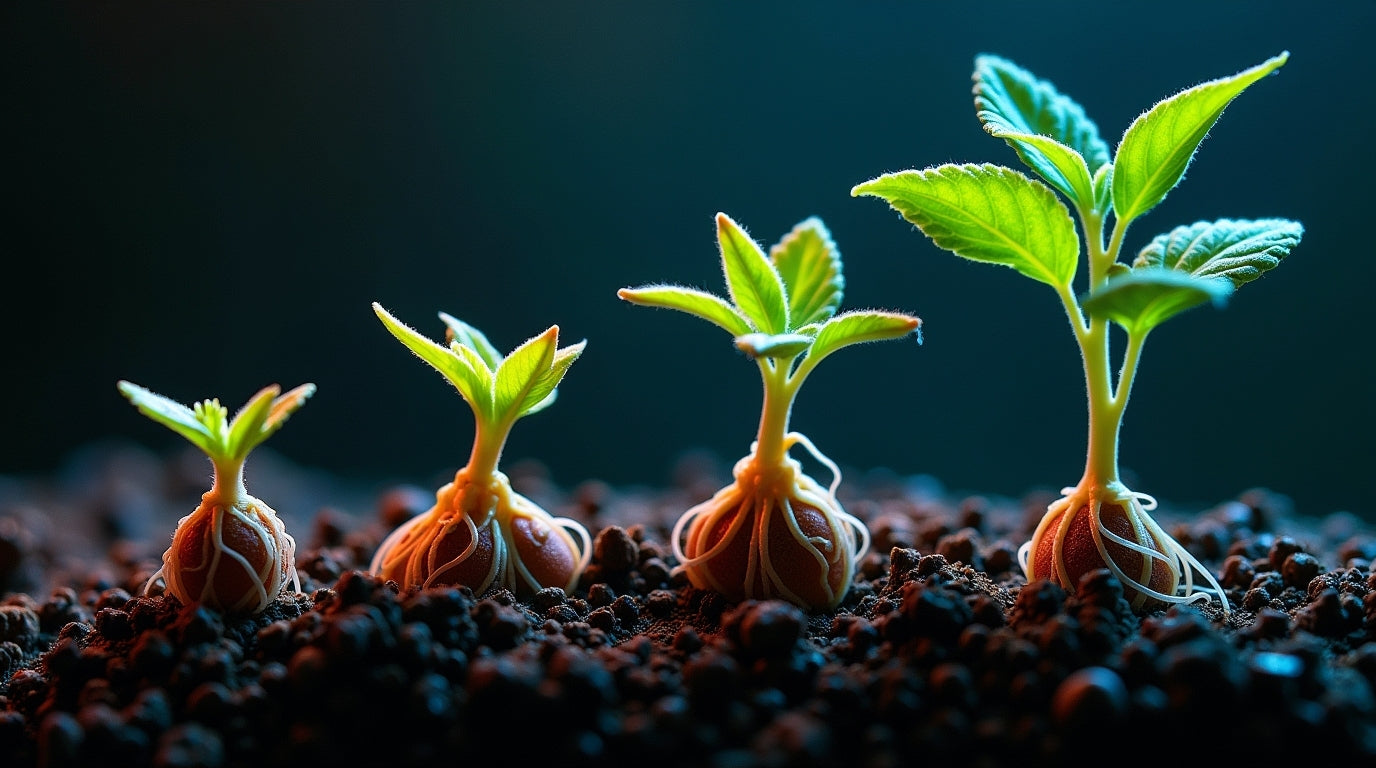
How to Grow Cannabis at Home: Your Complete Guide to Personal Cultivation
Growing cannabis at home gives you complete control over your supply, quality, and costs while providing a rewarding hobby that connects you with your medicine or recreational cannabis. Whether you're looking to save money, ensure quality, or simply enjoy the cultivation process, home growing has never been more accessible or rewarding.
Modern home cannabis cultivation combines traditional gardening wisdom with cutting-edge technology. The right setup allows you to produce dispensary-quality cannabis in the comfort and privacy of your own home, regardless of your experience level or available space.
This comprehensive guide covers everything you need to know about growing cannabis at home, from legal considerations and space selection to harvest and beyond. With proper planning and the right equipment like professional grow tent systems, you can achieve consistently excellent results.

Legal Considerations for Home Cannabis Growing
Understanding Your Local Laws
Before starting any home cannabis cultivation, research your local and state laws thoroughly:
Key Legal Factors:
- Plant limits: Most legal states allow 3-12 plants per adult
- Possession limits: Harvested cannabis storage restrictions
- Residence requirements: Homeowner vs. renter considerations
- Visibility rules: Plants must be out of public view
- Age restrictions: Typically 21+ for recreational cultivation
Important Legal Notes:
- Laws vary significantly between states and localities
- Some areas allow growing but restrict certain methods
- Medical patients may have different limits than recreational users
- Landlord permission may be required for renters
Compliance and Safety
Documentation Best Practices:
- Keep cultivation receipts and legal documentation
- Maintain plant counts within legal limits
- Document medical recommendations if applicable
- Track harvest amounts and dates
Safety Considerations:
- Install proper electrical systems for grow lights
- Ensure adequate ventilation to prevent mold and odors
- Consider security measures to protect your investment
- Plan for emergency situations (fire, power outage)
Choosing Your Home Growing Space
Indoor vs. Outdoor Home Growing
Indoor Growing Advantages:
- Year-round cultivation capability
- Complete environmental control
- Privacy and security
- Protection from weather and pests
- Higher quality, more potent results
Outdoor Growing Benefits:
- Lower equipment costs
- Natural sunlight (free energy)
- Potentially larger plants and yields
- More environmentally sustainable
For most home growers, indoor grow tent systems offer the best balance of control, discretion, and results.
Indoor Space Selection
Popular Home Growing Locations:
Spare Bedrooms:
- Pros: Easy access, climate control, privacy
- Cons: Loss of living space, may need ventilation modifications
- Best for: Serious growers with dedicated space
Basements:
- Pros: Natural temperature stability, privacy, space
- Cons: Potential humidity issues, limited natural light
- Best for: Large-scale personal cultivation
Closets:
- Pros: Discrete, contained, existing electrical
- Cons: Limited space, height restrictions
- Best for: Compact grow tent setups
Garages:
- Pros: Spacious, separated from living areas
- Cons: Temperature extremes, security concerns
- Best for: Climate-controlled garage spaces
Space Requirements and Planning
Minimum Space Considerations:
- Height: 4-6 feet minimum (more with extension kits)
- Floor area: 2x2 feet minimum for 1-2 plants
- Access: Easy daily maintenance and monitoring
- Electrical: Adequate power for lights and ventilation
- Ventilation: Air exchange capability
Essential Equipment for Home Cannabis Growing
Complete Equipment Checklist
Growing Environment:
- Grow tent: Creates controlled microenvironment
- Grow lights: LED systems for energy efficiency
- Ventilation system: Exhaust fan, intake, carbon filter
- Environmental monitoring: Temperature/humidity meters
Plant Care Supplies:
- Growing medium: Soil, coco coir, or hydroponic setup
- Nutrients: Vegetative and flowering formulations
- pH testing kit: Ensure optimal nutrient uptake
- Containers: Fabric pots or plastic containers
- Training supplies: Wire, clips for plant training
Harvesting and Processing:
- Trimming scissors: Sharp, clean cutting tools
- Drying racks: Proper curing equipment
- Storage containers: Airtight jars for cured cannabis
Grow Tent Systems: The Heart of Home Growing
Modern grow tents transform any space into a professional growing environment:
Benefits of Quality Grow Tents:
- Light containment: Prevents light leaks during flowering
- Odor control: Easier carbon filter integration
- Climate isolation: Maintain different conditions than surrounding room
- Reflective interior: Maximize light efficiency
- Modular design: Easy setup, expansion, or relocation
Gorilla Grow Tents set the industry standard with 1680D thick canvas, reinforced frames supporting 300+ pounds, and adjustable height systems that adapt to your plants' needs.
Sizing Your Home Grow
Beginner Recommendations:
- 2x2 grow tent: 1-2 plants, perfect for learning
- 3x3 grow tent: 2-4 plants, good personal supply
- 4x4 grow tent: 4-6 plants, optimal for most home growers
- Larger systems: For experienced growers with higher needs
Match your tent size to your legal plant limits and consumption needs.
Step-by-Step Home Growing Process
Planning Your Grow Cycle
Timeline Planning:
- Seed selection: 2-4 weeks before starting
- Germination: 3-7 days
- Seedling stage: 2-3 weeks
- Vegetative growth: 4-8 weeks
- Flowering: 8-12 weeks
- Harvest and cure: 4-8 weeks
Strain Selection for Home Growing:
- Autoflowering varieties: Easier for beginners, faster harvest
- Feminized seeds: Eliminate male plants, maximize space efficiency
- Indoor-adapted strains: Bred for controlled environments
- Personal preference: Consider desired effects and flavors
Germination and Early Growth
Germination Methods:
- Paper towel method: 24-48 hours in damp paper towels
- Direct soil planting: Plant seeds directly into growing medium
- Water glass method: Soak until taproot emerges
Seedling Care (Weeks 1-3):
- Light schedule: 18 hours on, 6 hours off
- Temperature: 70-75°F for optimal development
- Humidity: 65-70% for healthy growth
- Watering: Keep medium moist but not waterlogged
Vegetative Stage Management
Optimizing Vegetative Growth:
- Light intensity: Gradually increase as plants mature
- Nutrients: Higher nitrogen for leaf and stem development
- Training techniques: LST, topping, SCROG for maximum yields
- Environmental control: Maintain optimal humidity levels
Plant Training for Home Growers:
- Low Stress Training (LST): Bend branches for even canopy
- Topping: Remove main cola to encourage bushy growth
- Screen of Green (SCROG): Use screens to train branches horizontally
- Defoliation: Strategic leaf removal for light penetration
Flowering Stage Success
Triggering Flower:
- Switch to 12 hours light, 12 hours complete darkness
- Maintain strict light schedule (no interruptions)
- Adjust nutrients to flowering formulations
- Reduce humidity to prevent bud rot
Flowering Timeline:
- Weeks 1-3: Stretch phase, plants double in height
- Weeks 4-6: Bud formation and rapid development
- Weeks 7-9: Bud maturation and resin production
- Weeks 10+: Final ripening, monitor for harvest readiness

Home Growing Best Practices
Daily and Weekly Maintenance
Daily Tasks:
- Check temperature and humidity levels
- Inspect plants for pests or problems
- Monitor soil moisture and water as needed
- Adjust lights and ventilation as plants grow
Weekly Tasks:
- Deep plant inspection for health issues
- Nutrient feeding (if using liquid nutrients)
- Training and pruning as needed
- Clean and maintain equipment
Monthly Tasks:
- Deep clean grow space
- Replace air filters
- Calibrate pH and EC meters
- Plan next grow cycle
Common Home Growing Mistakes
Environmental Control Errors:
- Inconsistent light schedules during flowering
- Poor ventilation leading to mold issues
- Extreme temperature fluctuations
- Inadequate odor control affecting neighbors
Plant Care Mistakes:
- Overwatering (most common beginner error)
- Nutrient burn from overeeding
- pH imbalances preventing nutrient uptake
- Harvesting too early or too late
Planning and Legal Issues:
- Exceeding legal plant limits
- Inadequate security measures
- Poor record keeping
- Insufficient space planning
Maximizing Quality and Yield
Quality Optimization:
- Maintain consistent environmental conditions
- Use quality genetics from reputable sources
- Proper harvest timing for peak potency
- Careful drying and curing processes
Yield Maximization:
- Efficient use of grow space
- Proper plant training techniques
- Optimal lighting coverage
- Healthy plants throughout growth cycle
Home Security and Discretion
Protecting Your Investment
Physical Security:
- Secure grow area against unauthorized access
- Consider insurance implications
- Install security cameras if appropriate
- Maintain discretion about your growing activities
Odor Control:
- Carbon filtration systems for effective odor elimination
- Proper ventilation design
- Consider ozone generators for additional control
- Plan airflow to contain smells
Digital Security:
- Avoid posting about grows on social media
- Secure home network and smart devices
- Be cautious about online purchases and delivery
- Maintain privacy about cultivation activities
Neighbor Considerations
Being a Good Neighbor:
- Control odors effectively
- Minimize noise from fans and equipment
- Avoid obvious signs of cultivation
- Follow all local regulations and restrictions
FAQ Section
Q: How much cannabis can I legally grow at home? A: This varies significantly by location. Most legal states allow between 3-12 plants per adult for personal use. Some areas have additional restrictions on plant size, harvest amounts, or growing methods. Always check your local and state laws before starting.
Q: How much does it cost to start growing cannabis at home? A: Initial setup costs range from $500-800 for basic equipment to $2,000+ for premium systems. Monthly operating costs include electricity (typically $50-150/month for lighting) and nutrients. Quality equipment pays for itself through multiple harvest cycles.
Q: How long does it take to grow cannabis at home from seed to harvest? A: Most home grows take 4-6 months total: 2-4 weeks germination/seedling, 4-8 weeks vegetative growth, and 8-12 weeks flowering. Autoflowering strains complete their cycle in 10-14 weeks regardless of light schedule.
Q: What's the biggest challenge for new home growers? A: Environmental control is typically the biggest challenge. Maintaining proper temperature, humidity, and airflow while managing odors requires planning and quality equipment. Starting with a complete grow tent system eliminates most environmental variables.
Q: Can I grow cannabis at home if I rent my house? A: This depends on your lease agreement and local laws. Even where cannabis cultivation is legal, landlords may prohibit it in rental agreements. Always get written permission from your landlord and check local tenant laws before starting.
Featured Snippet Summary
How to grow cannabis at home: Choose legal compliant space, install grow tent with LED lights and ventilation, germinate seeds, grow 4-8 weeks vegetative under 18/6 lighting, switch to 12/12 for 8-12 weeks flowering, then harvest when trichomes are 70% cloudy. Maintain 70-85°F temperature and proper humidity throughout.
Transform Your Home into a Cannabis Growing Success Story
Growing cannabis at home successfully requires more than just putting seeds in soil—it demands the right environment, equipment, and knowledge to produce consistently excellent results. The difference between disappointing harvests and premium-quality cannabis often comes down to having professional-grade equipment that eliminates variables and maximizes plant potential.
Gorilla Grow Tents transform any home space into a professional cultivation environment. With industry-leading durability, adjustable height systems, and precise environmental control capabilities, you get the foundation needed for successful home growing from your very first harvest.
Whether you're converting a small closet space or planning a dedicated grow room, having professional equipment eliminates the trial-and-error process that frustrates many home growers. Your success shouldn't depend on luck—it should be built into your system.
Ready to start your home growing journey with confidence? Explore our complete grow tent systems and join thousands of home growers who choose reliability over risk for their most important harvests.
Take the next step toward mastering home cultivation with our expert guides on setting up your grow space and optimizing environmental conditions for maximum success.

Lena Myles
I'm a mushroom enthusiast and home cook based in Oregon. I'm passionate about foraging and creating fungi-focused recipes, especially delicious, plant-based dishes using gourmet mushrooms like trumpet, shiitake, and oyster. When I’m not in the kitchen, you’ll usually find me wandering the woods in search of new wild flavors.


